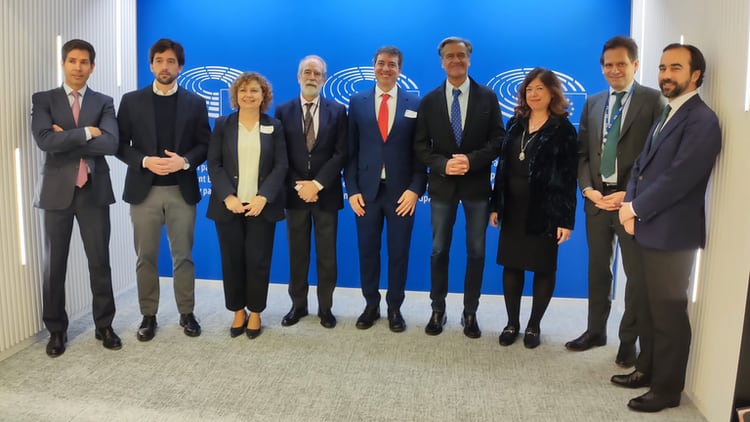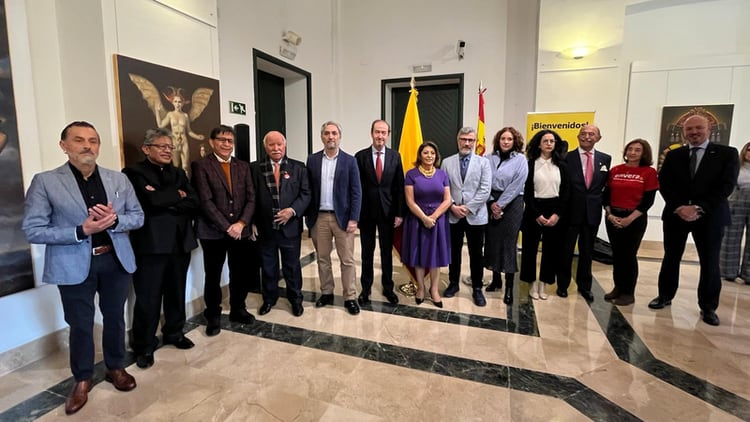Aquí Europa
The European Parliament hosted the Forum “Legal Guarantees for the Implementation of the European Regulation on Artificial Intelligence”, organised by Aquí Europa and Canal Europa in Brussels. The event, hosted by Adrián Vázquez Lazara MEP, brought together leading figures from different fields, ranging from the legal to the educational, to address the potential and ethical challenges of artificial intelligence.
Participants included the Dean of the Spanish Association of Registrars, the Vice-Rector for Digital Transformation and Education and Artificial Intelligence of the URJC and other prominent figures such as Alberto de Gregorio, Director of the Legal Service of the European Commission; Juan Fernando López Aguilar, Chairman of the Committee on Civil Liberties, Justice and Home Affairs; Ignacio González, Director of the Technological Innovation Committee of the Spanish Association of Registrars; Carlos Romero Duplá, former Advisor for Digital Transformation of the Permanent Representation of Spain to the European Union; Irene Lanzaco, Vice-President of the Board of Directors of News Media Europe; and Enrique Maside Páramo, Member for European Affairs of the Spanish Association of Registrars, who offered valuable perspectives on regulation and fundamental rights in the context of AI.
Jesús González Mateos, director of Aquí Europa and Canal Europa, in charge of leading the event, highlighted the transformative potential of artificial intelligence to streamline processes and improve efficiency in various areas of work. He also highlighted the choice of the European Parliament as the venue for the forum, underlining the European Union’s leadership in articulating a pioneering legal framework at regional level, reflecting Europe’s commitment to the protection of fundamental rights and freedoms.
Under European law, both the providers of this technology and its distributors and users must ensure compliance with a series of obligations, considering the level of risk of the artificial intelligence system in question. In addition, transparency is one of the fundamental pillars of this new regulation.
The Director of the European Commission’s Legal Service, Alberto de Gregorio, addressed the political context in which the legislative proposal emerged, stressing that it is a regulation that responds to the EU executive’s political priorities on the need to regulate the risks associated with artificial intelligence, the concern about AI’s ability to become autonomous and the lack of transparency in its decision-making processes, and the importance of placing citizens at the centre of the digital transition.
De Gregorio pointed out that the proposed law is part of a broad digital legislative framework whose common objective is to protect fundamental rights and freedoms through relevant regulations such as the Digital Services Act, the Digital Markets Act and Data Governance.
On the next steps, the implementation of AI governance mechanisms at national level and the harmonisation of liability for AI-induced harm, which is currently under legislative negotiation, were mentioned.
Ethical challenges of AI
The ethical challenges posed by this technology were also debated. Mª Emilia Adán García, dean of the Spanish Association of Registrars, acknowledged the challenge of regulating AI so that it does not represent “a step backwards in the right of defence, in the possibility of the citizen remaining at the centre of legal life”. He advocated an instrumental approach to AI, stressing that while it can speed up processes, speed alone should not be a primary value, as it can harm citizens’ rights. He suggested keeping the focus on upholding human values and fundamental rights in the development and application of AI, highlighting the critical role of registrars in protecting these rights.
In this context, Adán emphasised the importance of focusing on the non-contractual liability of the possible consequences that tools managed autonomously by artificial intelligence may have for citizens.
Carlos Romero Duplá, who until 1 March held the position of Digital Transformation Advisor at the Permanent Representation of Spain to the European Union, and who actively participated in the 38-hour trilogue held under the Spanish Presidency in which the regulation was approved, then spoke. Duplá broke down the content of the Artificial Intelligence Law, which is structured into four levels of risk, from absolute prohibitions at the first level to more lax regulations at the fourth level for systems with limited risk. He highlighted the flexibility of the regulation, noting that it “contains a multitude of adaptation clauses”.
The media were also represented at the forum, where Irene Lanzaco, Vice-President of the Board of News Media Europe, highlighted the complex situation of the media sector today. Lanzaco emphasised the need for content produced by journalists to be used with permission by major technology platforms, calling for the principle of net neutrality to be respected.
So, he called on legislators to “level the playing field for all”. He stressed the importance of ensuring that the development of innovation goes hand in hand with proper respect for the intellectual property rights of content creators, especially protecting information publishers as the most vulnerable party to the misuse of their content by large technological platforms.
A roadmap set by Europe
Adrián Vázquez Lazara, MEP for Renew and Chair of the European Parliament’s Legal Affairs Committee, remarked that the European Union has developed a pioneering regulatory framework for artificial intelligence. He outlined the relevance of establishing a regulatory framework for artificial intelligence, recognising that Europe is taking a significant step in defining global standards in this area.
He stressed that while legislation will need to be updated periodically to adapt to technological developments, it is crucial to have a solid starting point. He also acknowledged that there are inherent risks in AI, but also countless possibilities it offers for human progress and innovation.
He also emphasised the agreement and commitment of the different political groups to achieve this regulatory framework, considering it a success and a sign of cohesion in the search for common solutions. In this sense, he underlined the urgent need to act in order not to fall behind in terms of innovation and economic competitiveness, emphasising that Europe must remain at the forefront in this field.
Ignacio González, Director of the Technological Innovation Commission of the Spanish Association of Registrars, underlined the crucial role that registrars play in ensuring legal certainty in the context of artificial intelligence and the challenges associated with the implementation of the corresponding regulation.
In this regard, González pointed out that while AI presents both advantages and risks, the latter can result in potential harm. However, they also represent an opportunity to accumulate experience and improve efficiency in a number of areas, a mission to which the registry college is deeply committed.
Among other projects in which AI has been implemented, González highlighted the creation of an age verification software platform to prevent minors from accessing violent content by automatically tagging content.
Similar initiatives that seek to benefit from this technology are also being developed in the education sector. An example of this is POWER-U, a project launched by the Universidad Rey Juan Carlos with the aim of incorporating the advantages of Artificial Intelligence into all processes, services and groups at the Universidad Rey Juan Carlos.
César Cáceres Taladriz, Vice-Rector for Digital Transformation and Education and Artificial Intelligence at the URJC, said that the aim is to empower all staff and students at the university, benefiting from these technologies to automate processes, an initiative that was already being carried out in other sectors and in which the Spanish university identified great potential.
The impact of AI on citizens’ rights and freedoms
For his part, Juan Fernando López Aguilar, Chairman of the Committee on Civil Liberties, Justice and Home Affairs, pointed out that the Artificial Intelligence Regulation has a significant impact on human rights and freedoms, including the right to honour, personal dignity and the confidentiality of communications. For this reason, the Committee that López Aguilar chairs has worked to guarantee these freedoms, advocating a ban on uses such as mass biometric recognition.
He said that during the legislative process, Parliament has understood the revolutionary impact of artificial intelligence on all aspects of human life, which requires anticipation and effective regulation to protect individual rights. On the adaptability of regulation in the face of the speed at which technology is advancing, López Aguilar insisted on the importance of taking proactive measures to anticipate the challenges presented by the evolution of AI.
He stressed that the Parliament’s job as European legislator is to impose itself on the technological giants in their business model, establishing obligations and, if necessary, dissuasive sanctions. “We know that legislation always lags behind reality, but we have an obligation to keep a close eye on reality and to respond to the challenges it poses”, he reiterated.
The last speaker to speak was Enrique Maside Páramo, the Member for European Affairs of the Spanish Association of Registrars, who was in charge of presenting the conclusions of the conference. The Vocal Member for European Affairs of the Spanish Association of Registrars stressed the need to guarantee human decision-making at all times, but acknowledged that there are internal areas where artificial intelligence can generate procedures more efficiently, without compromising fundamental European values.
Maside pointed out that artificial intelligence can be used as a complementary tool to facilitate access to justice and be used constructively. He concluded by stressing the importance of protecting personal data and promoting the responsible use of artificial intelligence, in line with European principles.







